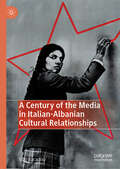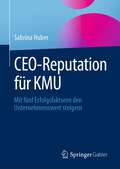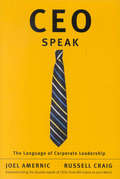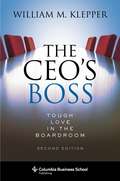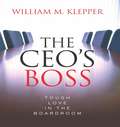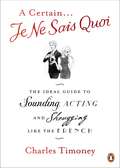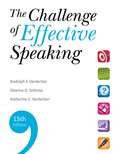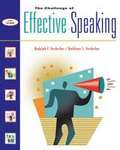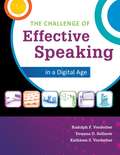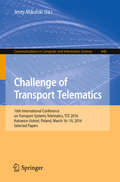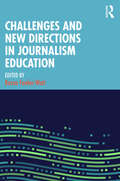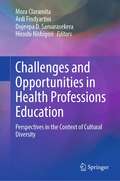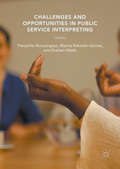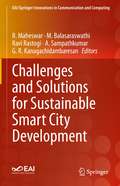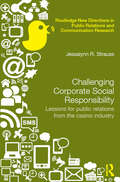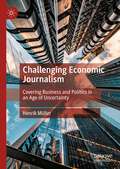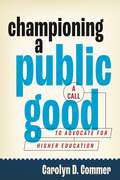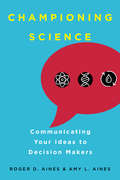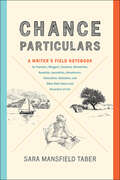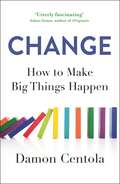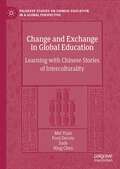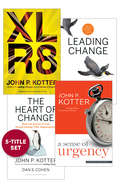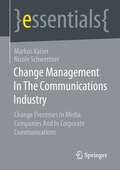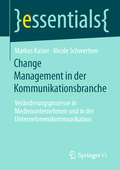- Table View
- List View
A Century of the Media in Italian-Albanian Cultural Relationships
by Vito SaracinoThis book delves into the complex historical, cultural, and educational ties between Italy and Albania within the realm of media studies, examining various mediums such as press, radio, television, cinema, and the web. Beginning in the late nineteenth century with the inception of the first Albanian-language newspapers in Italy, the analysis progresses to explore the evolving relationship between Albanians and radio, initially focusing on Italian broadcasts before transitioning to national channels. Rapidly, Italian radio becomes a tool for fascist soft power, facilitating fascist Italy's occupation of Albania in 1939. The second section delves into the communist propaganda apparatus, encompassing radio, television, cinema, and music. It offers a comprehensive exploration of television's evolution, from its tentative beginnings in the 1960s to the proliferation of private broadcasters in the post-communist era. Concluding with the emergence of the internet, the book highlights the significant decline of Italian soft power in Albania and the Southern Balkans over the past 15 years. Instead, these regions increasingly look towards the Anglo-Saxon and Turkish spheres as models, not only in media but also in terms of migration and development.
CEO-Reputation für KMU: Mit fünf Erfolgsfaktoren den Unternehmenswert steigern
by Sabrina HuberDieses Buch zeigt, wie die CEO-Reputation als strategischer Faktor in kleinen und mittelgroßen Unternehmen gezielt gemanagt werden kann. Denn CEOs sind die ersten und obersten Botschafter:innen eines Unternehmens und ihr Verhalten beeinflusst die Reputation wesentlich. Mit ihrer Persönlichkeit, ihrer Kommunikation und ihrem Auftritt repräsentieren CEOs das Unternehmen nach innen und außen – bewusst und unbewusst. CEO-Branding sollte daher nicht als zufälliger Nebeneffekt betrachtet werden, sondern als entscheidender strategischer Hebel. Die Autorin hat fünf Erfolgsfaktoren und eine Formel für erfolgreiches CEO-Branding entwickelt und in der Praxis vielfach erprobt: Strategie, Persönlichkeit, Kongruenz, Botschaft und Konzept. Auf Basis dieser Faktoren lässt sich ein strukturiertes, zielführendes und messbares CEO-Branding entwickeln, das Unternehmen einen nachhaltigen Wettbewerbsvorteil bringt. Außerdem: Experteninterviews zeigen auf, wie das Thema in der Praxis angegangen werden muss.
CEO-Speak: The Language of Corporate Leadership
by Joel Amernic Russell CraigCEO-Speak explores the metaphors and persuasive strategies used by leaders at Enron, Microsoft, AOL-TimeWarner, General Electric, IBM, Nortel, Canadian National Railways, Andersen, Disney, and Alcan-Pechiney-Alusuisse. Amernic and Craig show that CEOs are frequently presented as heroes engaged in "the war of business" who can effect astonishing miracles of financial performance and reinvention. Contesting the notion that accounting is objective, CEO-Speak serves as an introduction to the controversies and ambiguities in corporate accountability and provides rich examples of the excesses of corporate communication.
The CEO's Boss: Tough Love in the Boardroom (Columbia Business School Publishing)
by William KlepperThe CEO’s Boss, originally published in 2010, is the definitive guide to a productive working relationship between corporate boards and CEOs. Speaking to an era when company directors must monitor the actions and day-to-day operations of their CEO, William M. Klepper offers eight essential lessons to help boards operate more effectively in this bold and independent role. Since the publication of the first edition, Klepper has continued to develop and apply its lessons for a variety of businesses and settings.In this second edition, Klepper renews the paradigm set forth in the first, with new case studies of companies such as Wells Fargo, BP, Hewlett-Packard, and Proctor & Gamble. Giving directors, executives, investors, and stakeholders the tools to make crucial relationships work, Klepper details the best techniques for selecting the right CEO, establishing a working relationship, and giving effective feedback. He affirms the importance of the social contract between directors and their CEOs, encourages directors to embrace their independence, and teaches executives to value tough love. He revisits the first edition’s case studies and derives new insights from how these companies followed—or failed to heed—the book’s precepts. He also takes a close look at the predictions he made almost ten years ago, providing new forecasts and integrating core knowledge to ensure that The CEO’s Boss remains essential in our ever-changing business landscape.
The CEO's Boss: Tough Love in the Boardroom (Columbia Business School Publishing)
by William KlepperIn order to avoid another Enron, WorldCom, or Tyco, company directors have assumed a bold and independent role in the boardroom, monitoring the actions and day-to-day operations of the CEO. This dramatic shift has created a new dynamic, one that requires careful negotiation from both parties to get the job done. Giving directors, executives, investors, and stakeholders the tools to make this relationship work, William M. Klepper describes the best techniques for building a productive partnership and establishing a plan of action for a variety of businesses and settings.Klepper, an executive educator, has worked with AT&T, Bausch & Lomb, Johnson & Johnson, Sony, Sun Microsystems, and a host of other corporations. He knows what makes a healthy partnership between a board and its CEO and the consequences of a bad fit. In this book, he details the eight practices of successful executives, such as facilitating innovation, motivating change, and developing leadership skills, and he explains what directors need to evaluate, such as working style, social behavior, and the handling of stress, before they commit to hiring a CEO. The most critical element is the social contract, in which directors and their CEOs agree to be transparent, continually reassess their company's risk, maintain core company values, and make a commitment to their stakeholders. These include employees, shareholders, customers, and the community. In this essential volume, Klepper encourages directors to embrace their independence, and he teaches executives to value tough love.
El cerebro de la gente feliz: Supera la ansiedad con ayuda de la neurociencia
by Ferran Cases Sara Teller¿Te imaginas cómo sería tu vida sin ansiedad? Este libro es una poderosa herramienta para que la dejes atrás. Si estás atrapado por ella y te aventuras a navegar entre estas páginas, descubrirás por qué te sientes así y cómo, usando técnicas sencillas, tanto físicas como mentales, lograrás superarla. A través de anécdotas muy personales, Ferran Cases cuenta su experiencia con la ansiedad y cómo consiguió vencerla después de más de quince años de sufrimiento. Sara Téller, física y doctora en neurociencia, explica qué pasaba en la cabeza de Ferran cada vez que tenía una crisis y te invita a conocer los secretos del cerebro para que logres olvidarte de la ansiedad para siempre. Este práctico manual te muestra las cosas tal como son, o como la ciencia dice hasta el momento que son, y te invita a ir más allá, ya que entender cómo funciona el cerebro te daun superpoder: comprender cómo funcionas tú, y este es el primer gran paso para vencer la ansiedad. Quizás algo tan sencillo como leer este libro, y aplicar lo que te propone, te permita superar eso que te está minando desde dentro, eso que no te deja disfrutar.
A Certain Je Ne Sais Quoi: The Ideal Guide to Sounding, Acting and Shrugging Like the French
by Charles TimoneyVocabulary alone isn't enough. To survive in the most sophisticated - and the most scathing - nation on Earth you will need to understand the many peculiarities of the (very peculiar) French culture. And for that you need A Certain Je Ne Sais Quoi.If you want to fit in with the French you'll have to know how to deal with sardonic waiters; why French children hate Charlemagne; the etiquette of kissing, joke-telling and drinking songs, what to do with a bidet, the correct recipe for a salade nicoise and, of course, how to convey absolute, shattering indifference with a single syllable (Bof!).Charles Timoney, the author of Pardon My French, provides a practical, pleasurable guide to the charms of the Gallic people - from their daily routines to their peerless gesticulations, from their come-ons to their put-downs. Read on and put the oh la la back into your French vacances. Your inner gaul will thank you for it.
The Challenge of Effective Speaking
by Rudolph F. Verderber Deanna D. Sellnow Kathleen S. VerderberDo you want to ace your public speaking course? All you need to know, including all of the skills that will help you become a confident speaker and conquer speaking anxiety, are thoroughly covered in THE CHALLENGE OF EFFECTIVE SPEAKING, 15e. A favorite with students, this best seller guides you through six key "Speech Planning Action Steps". The result? You'll learn how to prepare and deliver strong speeches that get you good grades in your public speaking course! You'll be guided through topic selection, audience analysis and adaptation, effective research (including appropriate use of Internet resources), organization (with an emphasis on outlining), and language and delivery. The new 15th edition of this nationwide best seller also including many online tools, including videos of actual student speeches accompanied by Interactive Video Activities that help you develop and strengthen your public speaking skills. Authors Rudy and Kathie Verderber, together with new coauthor Deanna D. Sellnow, have grounded this new edition with the latest research to give you an exceptional resource for creating and delivering your speeches.
The Challenge of Effective Speaking (12th edition)
by Rudolph F. Verderber Kathleen S. VerderberThis textbook introduces the skills of public speaking and applies them to work-related meetings, personal business transactions, and personal relationships. The authors describe how to develop confidence, listen effectively, analyze the audience, research information, organize ideas, practice delivery, and speak persuasively. Annotation ©2004 Book News, Inc., Portland, OR (book news.com)
The Challenge of Effective Speaking in a Digital Age (Sixteenth Edition)
by Rudolph F. Verderber Deanna D. Sellnow Kathleen S. VerderberAll the skills you need to know to become a confident speaker and conquer speaking anxiety are thoroughly covered in THE CHALLENGE OF EFFECTIVE SPEAKING IN A DIGITAL AGE, 16E. A pioneer in the field, this best seller guides you through six key Speech Planning Action Steps: topic selection, audience analysis and adaptation, effective research (including appropriate use of Internet resources), organization (with an emphasis on outlining), presentational aids (and how to avoid succumbing to "death by PowerPoint"), and language and delivery. The new edition also includes many online tools, such as videos of student speeches accompanied by Interactive Video Activities that help develop and strengthen public speaking skills. Grounded in the latest research, this new edition is an exceptional resource for creating and delivering speeches.
Challenge of Transport Telematics: 16th International Conference on Transport Systems Telematics, TST 2016, Katowice-Ustroń, Poland, March 16–19, 2016, Selected Papers (Communications in Computer and Information Science #640)
by Jerzy MikulskiThis book constitutes the thoroughly refereed proceedings of the 16th International Conference on Transport Systems Telematics, TST 2016, held in Katowice-Ustr#65533;n, Poland, in March 2016. The 37 full and 5 short papers presented in this volume were carefully reviewed and selected from 110 submissions. They present and organize the knowledge from within the field of intelligent transportation systems, the specific solutions applied in it and their influence on improving efficiency of transport systems.
Challenges and New Directions in Journalism Education
by Karen Fowler-WattDrawing on original and innovative contributions from educators, practitioners and students, Challenges and New Directions in Journalism Education captures and informs our understanding of journalism pedagogy in the context of ongoing shifts in journalism practice. Journalism is once again facing challenges, accused of elitism and often branded as too far removed from the reality of people’s lives. The post-truth context has engendered a crisis of trust, and journalism is portrayed as core to the problem, rather than the solution. Citizen journalism and societal shifts have provoked a move away from ‘top-down’ reporting, towards greater interactivity with audiences, but inclusivity remains an issue with news organisations and industry councils intensifying protocols in a bid to create more diverse newsrooms. This poses multiple questions for journalism educators: How is journalism education engaging with these imperatives in the ‘post-pandemic’ context? How can student perspectives inform our response? What journalism should we teach? Against this landscape, and in response to these questions, this book engages with a series of key themes and objectives related to challenges and new directions in journalism education. These include discussions around safeguarding, sustainability, journalism’s ‘democratic deficit’, integrating media literacy and the ‘post-pandemic’ context. Each chapter draws on primary data, case studies and examples to describe and unpack the topic, and concludes with practical suggestions for journalism educators. Challenges and New Directions in Journalism Education is key reading for anyone teaching or training to become a teacher of journalism.
Challenges and Opportunities in Health Professions Education: Perspectives in the Context of Cultural Diversity
by Mora Claramita Ardi Findyartini Dujeepa D. Samarasekera Hiroshi NishigoriThis book addresses health professions educational challenges specific to non-Western cultures, implementing a shifting paradigm for educating future health professionals towards patient-centered care. While health professions education has received increasing attention in the last three decades, promoting student-centered learning principles pioneered by leaders in the medical community has, for the most part, remain rooted in the Western context. Building from Hofstede’s analysis of the phenomena of cultural dimensions, which underpin the way people build and maintain their relationships with others and influence social, economic, and political well-being across nations, this book demarcates the different cultural dimensions between East and West, applied to medical education. The respective ‘hierarchical’ and ‘collectivist’ cultural dimensions are unpacked in several studies stemming from non-western countries, with the capacity to positively influence healthcare education and services. The book provides new insights for researchers and health professional educators to understand how cultural context influences the input, processes, and output of health professionals’ education. Examples include how cultural context influences the ways in which students respond to teachers, how teachers giving feedback to students, and the challenges of peer feedback and group work. The authors also examine causes for student hesitation in proposing ideas, the pervasive cultural norm of maintaining harmony, the challenges of teamwork in clinical settings, the need to be sensitive to community health needs, the complexity of clinical decision making, and the challenge of how collectivist cultural values play into group dynamics. This book aims to advocate a more culturally-sensitive approach to educating health professionals, and will be relevant to both students and practitioners in numerous areas of public health and medical education.
Challenges and Opportunities in Public Service Interpreting
by Théophile Munyangeyo Graham Webb Marina Rabadán-GómezPublic Service Interpreting is a hugely complex activity, encompassing human, ethical, commercial and political dimensions. It is unseen and unrecognized by most of the population but vital to those who depend on it for their security or wellbeing. The quality of PSI provision is seen by the authors as a clear indicator of how a society views and responds to the realities of a multi-ethnic and multilingual global community. Following recent significant changes in the power balance between them this book explores the increasing tensions among multiple stakeholders who together deliver such a fundamental service in a modern open society. Chapters focus on how all stakeholders need to appreciate the wider context of political and economic realities whilst collaborating more responsibly to deliver the conditions, training and support needed for expert linguists to be attracted to and retained in this vital profession.
Challenges and Solutions for Sustainable Smart City Development (EAI/Springer Innovations in Communication and Computing)
by R. Maheswar M. Balasaraswathi Ravi Rastogi A. Sampathkumar G. R. KanagachidambaresanThis book discusses advances in smart and sustainable development of smart environments. The authors discuss the challenges faced in developing sustainable smart applications and provide potential solutions. The solutions are aimed at improving reliability and security with the goal of affordability, safety, and durability. Topics include health care applications, sustainable smart transportation systems, intelligent sustainable wearable electronics, and sustainable smart building and alert systems. Authors are from both industry and academia and present research from around the world.Addresses problems and solutions for sustainable development of smart cities;Includes applications such as healthcare, transportation, wearables, security, and more;Relevant for scientist and researchers working on real time smart city development.
Challenging Corporate Social Responsibility: Lessons for public relations from the casino industry (Routledge New Directions in PR & Communication Research)
by Jessalynn R. StraussThe concept of Corporate Social Responsibility (CSR) has become increasingly widespread, as businesses seek to incorporate socially responsible behaviors while still being accountable to shareholders. Indeed some research has suggested that CSR in itself can form the basis of good PR by promoting consumers’ purchase decisions. Arguing that this approach is a dangerous oversimplification, this book takes a deeper look at the concept of CSR in a particularly challenging context - casino gaming. Originally the province of seedy, backdoor establishments in isolated cities, casino gaming has become a multibillion-dollar global industry. Drawing on in-depth research in Las Vegas, this unique study examines how and why corporations in the casino industry interpret and engage in CSR through community support, environmental issues, labor rights, and corporate governance. Through in-depth analysis of CSR in this industry, this book adds a new dimension to the debate on the role of CSR and public relations in business. Given the burgeoning relationship between CSR and corporate PR, the book seeks to illuminate CSR’s complexities, contradictions, and moral obligations. It will be of interest to all scholars of public relations, corporate communications, and corporate reputation.
Challenging Economic Journalism: Covering Business and Politics in an Age of Uncertainty
by Henrik MüllerThis book, inspired partly by journalism's failure to raise early warning flags in the run up to financial crises and by the rise of (economic) populism in recent years, puts forward a framework for economic journalism. It argues that that independent quality economic journalism is essential to the functioning of both the market and democracy but is under threat, and explores questions raised by the decline of media trust: what is the value of economic journalism? And how can journalists change their practices to counter this decline? The book takes a global approach with one chapter focusing on European integration and concludes with an outlook on the future of economic journalism, and the financing of journalism more widely.
Championing a Public Good: A Call to Advocate for Higher Education (Rhetoric and Democratic Deliberation)
by Carolyn D. CommerFrom decreased funding to censorship controversies and rising student debt, the public perception of the value of higher education has become decidedly more negative. This crisis requires advocacy and action by policymakers, educators, and the public. Championing a Public Good presents a clear set of strategies and tools for advocates making the case for renewing our civic commitment to public higher education.Taking a fresh look at one of the most controversial moments in the history of US higher education, the work of the Spellings Commission (2005–2008), Carolyn D. Commer argues that this body’s public criticisms of higher education and its recommendation to increase accountability and oversight—via market-based metrics—accelerated the erosion of the concept of higher education as a public good. Countering that requires a careful, forceful approach on the part of advocates. Commer draws from the public record to demonstrate a common set of arguments, metaphors, and rhetorical frames that can, in fact, flip the public debate over higher education to champion the public value of universities and colleges over their value as market commodities.Championing a Public Good is a powerful primer on how to change the course of public higher education in the United States. It will appeal especially to faculty, administrators, and policymakers in higher education.
Championing Science: Communicating Your Ideas to Decision Makers
by Roger D. Aines Amy L. AinesChampioning Science shows scientists how to persuasively communicate complex scientific ideas to decision makers in government, industry, and education. This comprehensive guide provides real-world strategies to help scientists develop the essential communication, influence, and relationship-building skills needed to motivate nonexperts to understand and support their science. Instruction, interviews, and examples demonstrate how inspiring decision makers to act requires scientists to extract the essence of their work, craft clear messages, simplify visuals, bridge paradigm gaps, and tell compelling narratives. The authors bring these principles to life in the accounts of science champions such as Robert Millikan, Vannevar Bush, scientists at Caltech and MIT, and others. With Championing Science, scientists will learn how to use these vital skills to make an impact.
Chance Particulars: A Writer's Field Notebook for Travelers, Bloggers, Essayists, Memoirists, Novelists, Journalists, Adventurers, Naturalists, Sketchers, and Other Note-Takers and Recorders of Life
by Sara Mansfield Taber“A guide to paying attention to the concrete, sensory details of experience and the process of getting them down on the page.” —James Barilla, author of My Backyard JungleBased on what accomplished nonfiction writer Sara Mansfield Taber learned in her many years of field notebook keeping, Chance Particulars is a unique and handy primer for writers who want to use their experiences to tell a lively, satisfying story. Often, writers try to turn their notes into a memoir, essay, travel piece, or story, only to find that they haven’t recorded enough of details necessary to create evocative description. To help writers overcome this problem, Taber has composed a true “field notebook for field notebook keepers.” Enhanced by beautiful illustrations, this charming and comprehensive guide is a practical manual for anyone who wishes to learn or hone the crafts of writing, ethnography, or journalism.Writers of all levels, genres, and ages, as well as teachers of writing, will appreciate this useful tool for learning how to record the details that build vibrant prose. With this book in hand, you will be able to recreate times and places, conjure up intricate character portraits, and paint pictures of particular landscapes, cultures, and locales.“At once a delicious read and the distilled wisdom of a long-time teacher and virtuoso of the literary memoir. Her powerful lessons will give you rare and vital skills: to be able to read the world around you, and to read other writers, as a writer, that is, with your beadiest conjurer’s eye and mammoth heart. This is a book to savor, to engage with, and to reread, again and again.” —C. M. Mayo, author of Miraculous Air
Change: How to Make Big Things Happen
by Damon Centola'A remarkable and important guide to effecting change in our individual lives, businesses, societies - and beyond' JONAH BERGER, bestselling author of ContagiousHow did movements like the Arab Spring and Black Lives Matter take off when they did? How did Lord Kitchener recruit 2,000,000 volunteers at the start of World War I?Why did Twitter take hold while Google+ has failed?What surprising lessons can we learn from Covid 19?From the spread of Covid-19 to the rise of political polarization, from implicit bias to genetically modified food, from NASA to Netflix - it's time to think differently about how change works.Professor Damon Centola is the world expert in the new science of networks. His ground-breaking research across areas as disparate as voting, health, technology and finance has highlighted powerful and highly effective new ways to ensure lasting change. In this book, Centola distils over a decade of deep experience into a fascinating new theory that challenges previous assumptions that new ideas are either contagious or not. Change shows that beliefs and behaviours are not transmitted from person to person in the simple way that a virus is. The real story of social change is more complex and much more interesting. When we are exposed to a new idea, our social networks guide our responses in striking and surprising ways. Drawing on deep-yet-accessible research and fascinating examples, Change presents a paradigm-shifting new science for understanding what drives change, recognising our blind spots and how we can change the world around us.
Change and Exchange in Global Education: Learning with Chinese Stories of Interculturality (Palgrave Studies on Chinese Education in a Global Perspective)
by Mei Yuan Fred Dervin Sude Ning ChenThis unique book starts from the premise that students, scholars, and educators should be given access to a form of global education that is genuinely global. Using the notion of interculturality as change and exchange as a basis, the authors examine fifty discourse instruments (e.g. idioms, neologisms, slogans) related to what they call ‘Chinese stories of interculturality’. China, like other countries, has a rich and complex history of intercultural encounters and her engagement with the notion today, which shares similarities and differences with glocal discourses of interculturality, deserves to be unpacked and familiarized with. By so doing, digging into the intricacies of the Chinese and English languages, the reader is empowered to unthink, rethink and especially reflect on their own take on the important notion of interculturality.
Change Leadership: The Kotter Collection
by John P. Kotter Dan S. CohenChange Leadership: The Kotter Collection
Change Management In The Communications Industry: Change Processes In Media Companies And In Corporate Communications (essentials)
by Markus Kaiser Nicole SchwertnerIn media companies and in corporate communications, digital channels are being added to traditional channels. The content is often produced in newsrooms. There is a growing awareness that communication measures are radically oriented towards the needs of the user. In these change processes, special emphasis must be placed on involving the employees. Because only then will the change process be economically successful. This essential shows why media companies and communication departments need a live change culture and how they can approach change systematically.
Change Management in der Kommunikationsbranche: Veränderungsprozesse in Medienunternehmen und in der Unternehmenskommunikation (essentials)
by Markus Kaiser Nicole SchwertnerIn Medienunternehmen und in der Unternehmenskommunikation kommen zu traditionellen Ausspielwegen digitale Kanäle hinzu. Die Inhalte werden oft in Newsrooms produziert. Es setzt sich das Bewusstsein durch, dass sich Kommunikationsmaßnahmen radikal am Bedürfnis des Users orientieren. Bei diesen Veränderungsprozessen muss ein besonderer Wert darauf gelegt werden, die Mitarbeiter mitzunehmen. Denn nur dann wird der Change-Prozess auch wirtschaftlich erfolgreich sein. In diesem essential wird aufgezeigt, warum Medienunternehmen und Kommunikationsabteilungen eine gelebte Change-Kultur brauchen und wie sie den Wandel systematisch angehen können.
